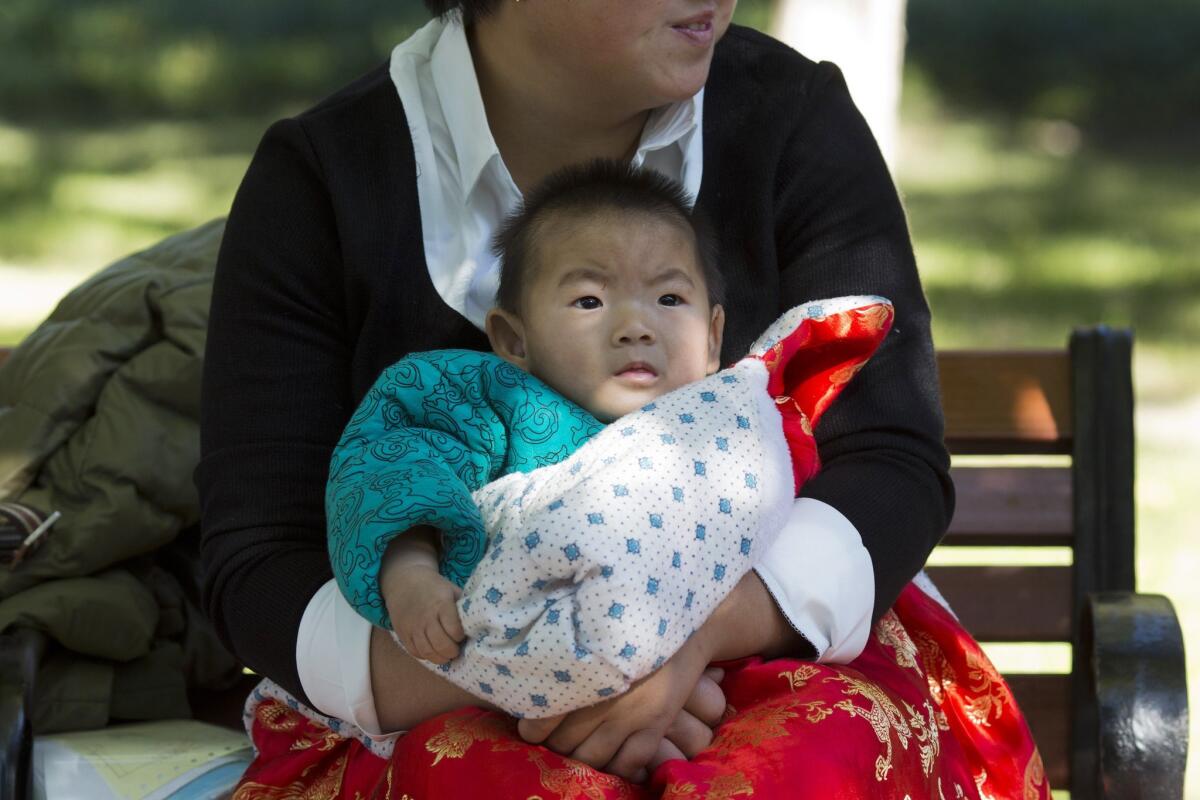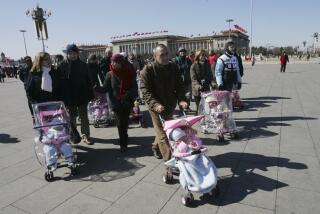Chinese recall sacrifices under one-child policy, cautiously ponder what’s next

A child is wrapped up against the cold at a Beijing park on Oct. 30, the day after China loosened its one-child policy.
- Share via
Reporting from Beijing — In June 2012, local authorities ambushed Deng Jiyuan’s wife, then seven months pregnant with the couple’s second child. Determined to enforce China’s one-child policy, they beat her, blindfolded her and transported her to a hospital, where she was injected with chemicals. Hours later, she delivered a stillborn girl.
Days later, pictures of the lifeless infant lying next to her mother in the hospital went viral online, prompting nationwide outrage at the brutal lengths to which some officials were going to enforce the family-planning effort.
On Friday, a day after Chinese Communist Party announced it was ending the 35-year-old one-child policy and will allow all married couples to have two children, Deng was not exactly celebrating a change that came too late for him.
“But I do think my case did help change the policy,” he said by telephone from his village in Shaanxi province. “At least at the local level, officials learned their lesson.”
Across the country Friday, Chinese were processing the momentous decision with a mixture of reserved satisfaction, wistfulness and skepticism.
Although many were pleased that the state was retreating a step from their intimate affairs, some urbanites expressed concern that the change might lead to a surge of births in poor and rural areas where schools and other facilities are under-equipped to deal with more children. Older Chinese, meanwhile, said the decision served as a reminder of how much their generation had sacrificed.
“As youths, we were sent to the countryside” during Mao Tse-tung’s 1966 to 1976 Cultural Revolution, when urban youths were forced to give up schooling and work in rural areas, said a 63-year-old woman surnamed Liu who was waiting in front of a Beijing children’s hospital Friday afternoon with her daughter and 2-month-old grandson. “Then, we had to submit to family planning. We gave a lot. We had all the misfortune.”
In 1980, the year the policy was adopted, Liu gave birth to her daughter, Zhou Jie. “At that time, we had traditional ideas and two children would have been better,” she said. “If I had had the chance to have more, I would have.”
“We tasted a lot of bitterness,” she said.
Officials decided to relax the policy because they are concerned that, in some ways, it has worked too well. China’s birthrate is 1.18 per woman, and the number of working-age people has shrunk by several million people per year for the last three years. Chinese society, meanwhile, is aging rapidly, and the government fears there will not be enough young people to support retirees.
China has about 1.37 billion people; with the two-child policy, officials said Friday they expect that to rise to 1.45 billion in 2030.
Liu’s daughter, now 35, is among those expanding their families. China in 2013 decided to allow couples in which at least one parent was an only child to have two children. This summer, Zhou gave birth to her second son; her older boy is 10.
“My older boy is already pretty independent, so we decided to have a second child,” she said.
How many others follow in Zhou’s footsteps, though, remains to be seen. In rural areas, long-standing exceptions for minorities, farmers and other categories of people have for years allowed many couples to have second children. So the impact in those areas may be limited.
In metropolises like Beijing and Shanghai, many young couples say they’re not particularly interested in having more than one child because of the expense or the career sacrifices they might have to make.
In so-called third- and fourth-tier cities, though, there may be significant interest among couples.
Xia Yuanyuan, a 38-year-old flower shop proprietor in Zhengzhou, already has a 2-year-old boy. Neither she nor her husband is an only child, so until this week, if they wanted to have a second child, they would have had to pay a fine. Now, she can go ahead without concern about the financial impact, though she said she wasn’t particularly worried about that.
“We had already decided to have a second child, because my younger brother has no kids, and my husband’s older brother also has no children,” she said. “As an only child, my son has no one to play with and there will be lots of pressure on him to take care of so many aging family members when he grows up.”
Yang Zhizhu, a researcher at the China Youth University for Political Sciences who has led a personal campaign against the one-child policy for years, said he expected the shift to have a “very small” effect on the size of China’s population. He noted that even after the 2013 relaxation, only about 11% of eligible couples registered to have a second child.
Yang, who was suspended from his job as a professor for two years after his wife gave birth to a second child, said he was not surprised that Thursday’s change was made, only that it took so long. There were many barriers to reforming the policy, he said, not least of which is that at least 400,000 people, and perhaps as many as 2 million, work in jobs related to family planning.
“So many people’s interests were involved. Family planning is a political thing, and if they change it, that means there will be questions: ‘Was the previous policy wrong?’” he said. “Let’s not forget that many otherwise able officials lost their jobs because they did not meet family-planning targets.”
The officials who accosted Deng’s wife in 2012 apologized, Deng said, and the couple received about $11,500 in compensation.
The couple welcomed a new baby, a girl, two months ago, he said.
“This was very exciting for us. We had been through a very hard time, and my wife had trouble getting pregnant again,” he said. “Here in the countryside, we rely on our children when we get older.”
But single children in major cities say the burden of being the only offspring is also intense.
Zhang Yu, a 26-year-old salesman in Beijing, said his father recently had surgery and needed intensive care for two weeks.
“I wish I had a sibling to share the work or simply support each other mentally,” he said. “We hired someone to help us look after my father, but you cannot expect too much from someone who isn’t related to you.”
Zhang said he planned to get married in a few months and the question of children is front and center in his mind.
“I keep thinking if I only have one child, how tired will my child be if I’m old and sick?” he said. “But it’s very hard to raise two children. Nothing is cheap.”
Follow @JulieMakLAT on Twitter for news out of Asia
MORE CHINA NEWS:
An American magician takes his tricks to China
How U.S.-China skirmish in South China Sea could affect trade
China’s Studio City, a Hollywood-themed casino-resort, opens in Macau
More to Read
Sign up for Essential California
The most important California stories and recommendations in your inbox every morning.
You may occasionally receive promotional content from the Los Angeles Times.














